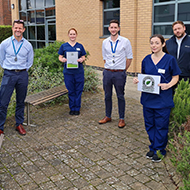Solihull animal hospital earns environmental accreditation

"Ensuring we have an environmentally sustainable hospital is extremely important to us" - Toby Gemmill, managing director at Willows.
Willows Veterinary Centre and Referral Centre in Solihull has been recognised by Investors in the Environment (iiE) for its sustainable practices.
The small animal hospital set up a dedicated 'Green Giants' group, and set up initiatives across the practice, including switching all lighting to LED energy-saving lights, creating new waste streams, and reducing single-use items.
Willows has seen significant results from its sustainable initiatives, including an eight per cent overall drop in electricity usage across the hospital, a seven per cent fuel reduction, and a 12 per cent rise in recycling.
Dave Hindley, building and facilities manager at Willows, who is spearheading the scheme, commented: “Willows is very proud of this iiE Silver award.
“We want to continue to make significant environmental savings across our site, by looking into technology such as solar panels, electric car charging points and an electric van, which will help take us to the next level and reduce our carbon footprint even more.”
April Sotomayer, from iiE, added: “Congratulations to Willows on achieving this silver award for its work on reducing its environmental impact and engaging its staff with some fantastic waste and carbon reduction initiatives, in particular.
“This shows a clear determination to prioritise its sustainability efforts in line with our independent accreditation scheme and we’re excited to see them go even further in the future.”



 The Veterinary Medicines Directorate (VMD) is inviting applications from veterinary students to attend a one-week extramural studies (EMS) placement in July 2026.
The Veterinary Medicines Directorate (VMD) is inviting applications from veterinary students to attend a one-week extramural studies (EMS) placement in July 2026.